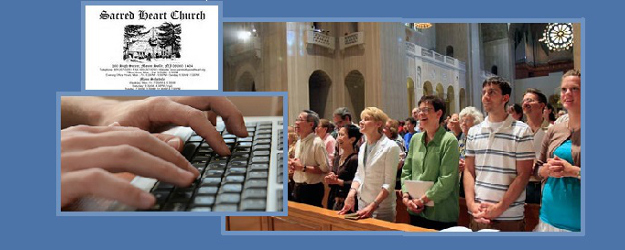
Pastors reaching out in church bulletin essays to their flocks
In an essay about his father, William Buckley, Christopher Buckley wrote that he noticed that the parts that sounded most characteristic of his father were actually added to the drafts late in his process of writing. His father, a famously articulate speaker, did not find it easy to be so “on the page.”
Any of us who write a weekly pastor’s page in the bulletin, or who are asked to offer some “thoughts” for a parish newsletter, can attest that writing that is clear, interesting, and sounds natural is no easy task. But there are some basics that can help.
Variety: Like preaching, it helps if your writing is not entirely predictable, week after week. Mix it up: Tell about your visit to the Women’s Guild and what great work they are doing for the poor. Put together some of the more interesting recent quotes of Pope Francis. Write about the ups and downs of being their pastor/parochial vicar. Describe the good that goes on in your various ethnic communities. Encourage civic or sports involvement. Explain some aspect of Church teaching. Give an overview of Luke’s gospel when it is highlighted in the lectionary. Make the case for becoming a catechist or altar server. Tell them why you sing in church, even though you don’t have a great voice. Review a book you think they might want to read. Your writing gives you a chance to communicate ideas that don’t easily fit into a homily.
Don’t: Your writing should not be another homily; they get that every week out loud at Mass. Don’t whine; it makes you look weak. Instead of complaining, tell your parishioners what you want, and then tell them why it is important to you. Avoid advertising; how long would you read someone who always asks for something? Don’t use the names of people you are writing about unless you are saying something complimentary.
Do: You want to write well enough to keep your readers interested every week. Our education has gotten us in the habit of explaining things, which is not always what you want to do. The old saw for writers is “show, don’t tell.” Instead of commanding or giving advice, draw your readers into an experience. Robert Frost used to tell his students not to give him their conclusions but to describe the process by which they came to their conclusions. Marilynne Robinson says, “A question is more spacious than a statement, far better suited to expressing wonder.”
Use humor that’s self-deprecating; people will not take you seriously if you don’t.
Write about what interests you. Here are a few ideas: “I was thinking of our young families, and wondering how they felt about bringing up a child in our challenging world. So I asked the parents of those who were having their children baptized, and they told me…” “This Sunday, you see the newly refinished pews. Let me tell you how we got them, and who helped us along the way….” “I want to suggest a topic for discussion for the dinner table this week; ask the question: What is your favorite Christmas tradition?”
Process: In your first draft, write down everything that comes into your mind with regard to your chosen topic. Don’t edit yourself. What does it look like, sound like, feel like, and even smell like? How does it touch you, and how will your readers feel touched? Then let it sit overnight. When you come back to it the next day with a fresh mind, imagine yourself reading it out loud to the members of your pastoral council. What would interest them? What might bore them? What’s missing? What else do they need to know so they can understand what you are trying to communicate? Make sure everything you want to say is actually there “on the page.” The danger with writing from experience is that the writer remembers all the feelings and images that made the experience so interesting to him, and presumes that he has put them on the page, that people will experience it the same way the writer did. Flannery O’Connor once said that she wrote not just so that the reader will understand, but so that the reader will understand it in exactly the way she intends. Ask if each paragraph flows properly; the first sentence in a draft often fits better as the concluding sentence in a paragraph since it really is a summary.
Do your homework: A friend asked me once what I thought of a fun article he’d written for a fundraiser. After much hemming and hawing, I said, “If you want to write well, you need to read better writers.” I was trying to be diplomatic, but he took my words to heart, and his writing improved because he started reading as a writer, noting how a good article is put together, seeing various ways that ideas and experiences can be expressed. But you have to read lively writing, and that is exactly what most theological texts and scripture commentaries are not. Here’s a list of starting points: The Saying of the Desert Fathers; Flannery O’Connor’s Mystery and Manners; anything by Brian Doyle, Sebastian Moore or Timothy Radcliffe; Walker Percy’s Signposts in a Strange Land; Thomas Merton’s Raids on the Unspeakable; Ann Patchett’s This is the Story of a Happy Marriage; Marilynne Robinson’s The Death of Adam; Richard Rodriguez’s Hunger of Memory. Don’t overlook poetry; Mary Oliver, Seamus Heaney and Billy Collins are good for starters. The hope is that what we read will train us to experience the world more deeply. As Mary Oliver says, “Unless you believe that heaven is very near, how will you find it?”
Recent Comments